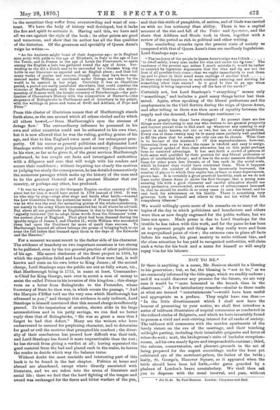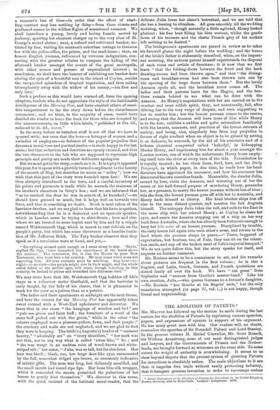NOT TO BE.*
IF there is anything in a name, Mr. Benison should be a blessing to his generation ; but, so far, the blessing is "not to be," as we are ominously informed by the title-page, which we readily endorse ; and if we could discover any promise for the future, we are very sure it would be "more honoured in the breach than in the observance." A few introductory remarks—similar to those made at what are termed "entertainments "—would have been useful and appropriate as a preface. They might have run thus :- 'In the little divertissement which I shall now have the honour of presenting to your notice, we shall first introduce it series of tableaux illustrative of nuptial ceremonies as conducted in the refined circles of Belgravia, and which we have invariably found to possess a vivid and soul-stirring interest for all ranks of society. The tableaux will commence with the maiden apartments of the lovely sisters on the eve of the marriage, and their touching midnight parting, including their inimitable peignoirs and loves of robes-de-nuit ; next, the bridegroom's suite of bachelor reception- rooms, .nd his own manly figure and irreproachable costume ; third, the saloons, conservatories, and pleasure-grounds in the act of being prepared for the august assemblage under the keen yet cultivated eye of the merchant-prince, the father of the bride ; lastly, St. George's, Hanover Square, as it appeared when the bride should have been led forth,—the gates guarded by a. phalanx of London's brave constabulary. We shall then ask you to dispense with the usual interval, and pass, without • Not To Be. By Paul Benison. London; Chapman and Hall.
a moment's loss of time—in order that the effect of start- ling contrast may lose nothing by delay—from these chaste and perfumed scenes to the wildest flights of sensational romance. We shall introduce a young, lovely and loving female, moved by jealousy, spurring her chestnut charger up to the very altar of St.
George's sacred shrine ; next, a refined and cultivated banker, ac- tuated by fear, visiting his mistress's suburban cottage to threaten her with the police-office, the prison, and the mad-house ; then, an honest English yeoman, influenced by virtuous indignation, con- sorting with the greatest villains to compass the hiding of the aforesaid banker amongst the sewers of the great metropolis, with other scenes and persons of unparalleled interest ; in conclusion, we shall have the honour of exhibiting our banker-hero closing the eyes of a beautiful nun in the island of Ceylon, amidst the unequalled splendour of tropical vegetation, and then sailing triumphantly away with the widow of his enemy,—his first and 'only love.'
Such a preface as this would have warned off, from the opening chapters, readers who do not appreciate the style of the fashionable intelligence of the Morning Post, and have enabled others of sensi- tive temperament to lay the story down before the disturbances commence ; and we trust, in the majority of cases, would have decided the reader to leave the book for those who are tempted by the announcements, on little white labels, "published at 31s. 6d., reduced to 2s. 6d., uncut."
In the story before us harmless stuff is not all that we have to 'quarrel with; nor even that the hero—a betrayer of women and a swindler of employers—in defiance of the popular prejudice that 'favours a moral tone and poetical justice—is made happy in the last scene; but that seduction and desertion are openly excused, and that the two characters in the tale who are supposed to represent high principle and purity are made their deliberate apologists.
But we must get to the story,—such as it is. It is a pity it appeared this year, for it opens with a prettily turned compliment to the beauty 'of the month of May, but describes its noons as "sultry "; how we wish that this part of the story were founded upon fact ! We are then abruptly introduced to the hero, and a careful inventory of his points and garments is made while he ascends the staircase of his brother's chambers in Gray's Jun; and we are informed that "as he reached the door he was in search of, he knocked ;"—we should have guessed as much, but it helps well on towards two lines, and that is something no doubt. Stock is next taken of the barrister-brother, and we are glad to learn that his linen is spotless, notwithstanding that he is a democrat and an open-air speaker, which in London must be trying to shirt-fronts ; here and else- where we are treated to some boyish rant by him and by a cripple named Wolstonecroft Ogg, which is meant to cast ridicule on the people's party, but which has some cleverness as a humble imita-
tion of Mr. Jefferson Brick. The Tory banker observes that they speak as if a revolution were at hand, and yet,— "Everything seemed quiet enough as I came along to-day. 'Bards,' replied Mr. Ogg, 'have remarked the smoothness of the water above the cataract. The revolution, Sir, is like the Master in your New 'Testament, who went into a far country. He may come when none are expecting him. All true servants must be watching. Any hour—to- night—to-morrow—the people might rise in their might, and the whole social fabric of the middle ages, still erect, though tottering, in this country, be dashed in pieces and crumbled into dishonest dust.'"
We may state here that Mr. Wolstonecroft Ogg hobbles off life's stage as a volunteer under Garibaldi, and that the barrister is early taught, by the lady of his choice, that it is pleasanter to work for the poor as a patron than as a patriot.
The ladies and their apartments at midnight are the next theme, and here the caterer for the Morning Post has apparently taken sweet counsel with a West-End upholsterer and decorator. We
learn that in one room "the hangings of window and bed" are "pale sea-green and faint buff ; the furniture of a wood of the same buff picked out with the green," while in the other "the colours employed were a pimrose-yellow, fawn, and dark purple ;" the crockery and walls are not neglected, and we are glad to find they were in keeping. The bride's (Augusta's) head is of "eminent
beauty," "admirably set" on "ivory shoulders," "her neck was not thin, nor in any way what is called ' swan-like,' " &c. ; and -" she was wrapt in an undress robe of wood-brown and white- striped silk ;" her sister, "Julia, was as tall, but far slenderer. Her hair was black ; black, too, her large deer-like eyes, surmounted by the full, somewhat ridged eye-brows, so commonly indicative .of artistic gifts. The nose was long, but delicately moulded, and the small mouth had round ripe lips. Her loose blue silk wrapper, -whilst it concealed the snows, permitted the pulsations of her
bosom to gently hint themselves." We discover in this scene, with the quick instinct of the habitual novel-reader, that the
delicate Julia loves her sister's betrothed, and we are told that she has a leaning to ritualism. All goes smoothly till the wedding morning, when, "though naturally a little agitated, Henry looked glorious ; his fine bust filling his blue surtout, whilst the gentle fawn of his trousers and the chaste French grey of his necktie left nothing to be desired."
The bridegroom's apartments are passed in review as he takes his farewell glance the night before the wedding ; and the house of the bride's father is elaborately described, when, on the import- ant morning, the anxious parent himself superintends the disposal of each room and article of furniture ; it ill now that we first learn "that the folding-doors between the front and the back drawing-rooms had been thrown open," and that "the dining- room and breakfast-room had also been thrown into one by the opening of the large doors between them." But the lovely Amazon spoils all, and the breakfast never comes off. The ladies and their parents leave for the Hague, and the bro- thers remain behind to see what can be done with the Amazon. As Henry's negotiations with her are carried on in the cruelest and most selfish spirit, they, not unnaturally, fail, after driving her to the very verge of despair, and even suggesting to her to murder him ; but the honest yeoman comes to the rescue, and seeing that the Amazon will have none of him while Henry is to the fore, exhibits a sudden and quite miraculous familiarity with the haunts, manners, and practices of the lowest outcasts of society, and being, also, singularly free from any prejudice in favour of right conduct when an object is to be gained by setting it at defiance, he succeeds, by the aid of his associates and of a hideous chemical compound called ' kakodyl,' in kidnapping Master Henry, and imprisoning him for about a year amongst the London sewers, one of which the unfortunate Henry hears empty- ing itself into the river at every turn of the tide. Nevertheless he is royally treated ; he has clean linen, food, beer, and the Daily Telegraph, in which paper, in due time, he reads how his bank directors have appointed his successor, and how his successor has discovered his own countless frauds. Meanwhile, the slender Julia, moved by love, visits the Amazon, and worming out of her the secret of her half-formed purpose of murdering Henry, persuades her, as a penance, to marry the honest yeoman without loss of time ; this she does, the honest yeoman goes off with her to Australia, and Henry finds himself at liberty. His kind brother ships him off also to the same distant quarter, and marries the fair Augusta himself. The unhappy Julia takes the veil, and sails to the East in the same ship with her adored Henry ; at Ceylon he closes her eyes, and meets the Amazon stepping out of a ship on her way back from Australia, where she has already been fortunate enough to bury her bete noire of an honest yeoman. Disciplined by trouble, the early lovers fall again into each other's arms, and return to the land where the yeoman sleeps in peace,—" There, beggared of expectation, bat fearless, too, of Fate, they can sit on the colour- less sands, and sup off the broken meat of Life's imperial banquet." We do not quite follow this, but the story speaks for itself, and requires no further comment.
Mr. Benison seems to be a connoisseur in art, and his remarks about pictures are frequent in the first volume ; he is also a linguist, and Latin, Greek, German, and French quotations are dotted freely all over the book. We have "cut gems" from Sophocles and "cameos from Goethe's master-hand." Like his own creation, Julia,—who quotes German to a farmer's daughter, —Mr. Benison "has Goethe at his fingers' ends," but the only translation attempted (at page 37, vol. i.,) is not happy, though literal and unpretending.































 Previous page
Previous page